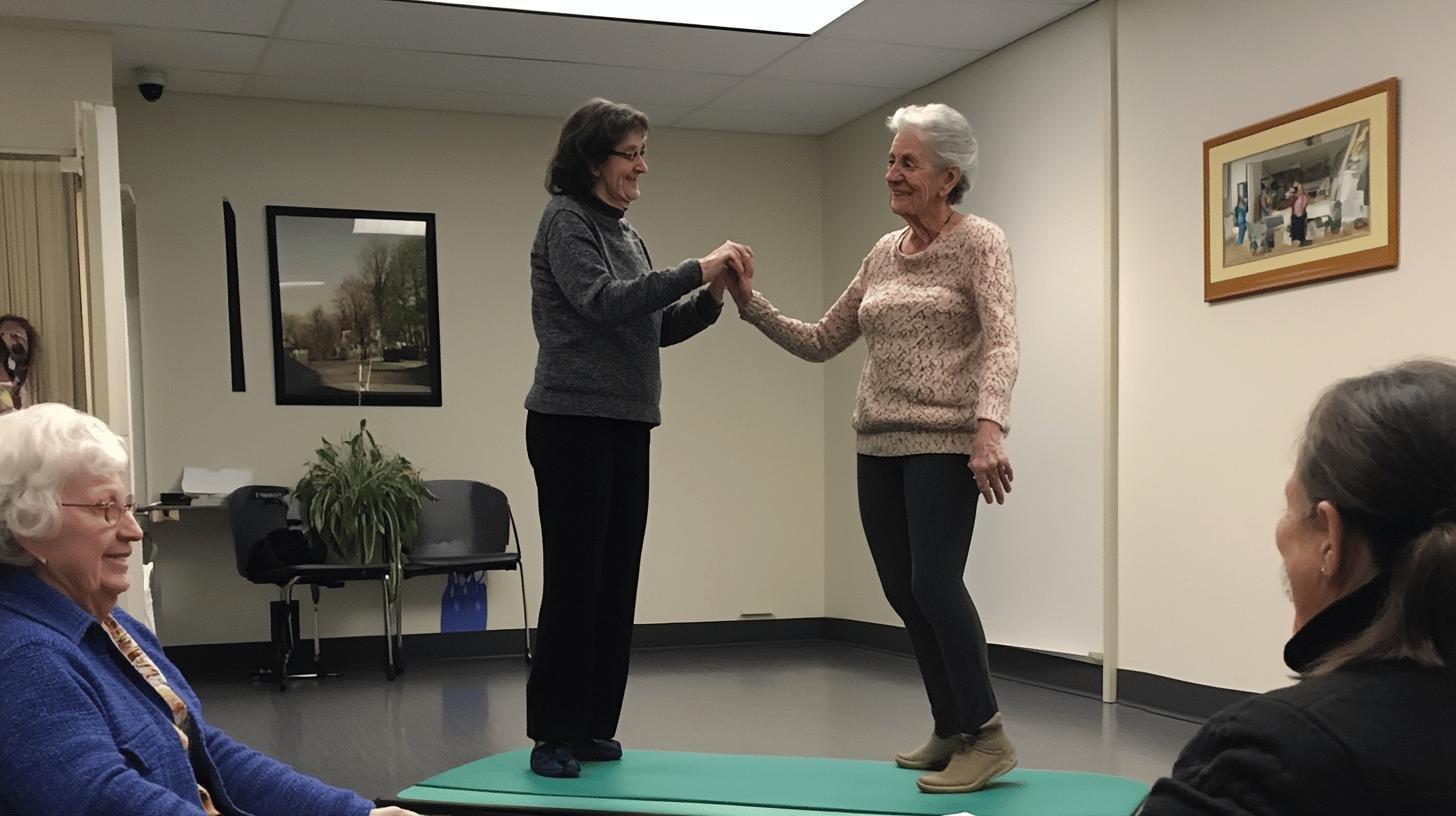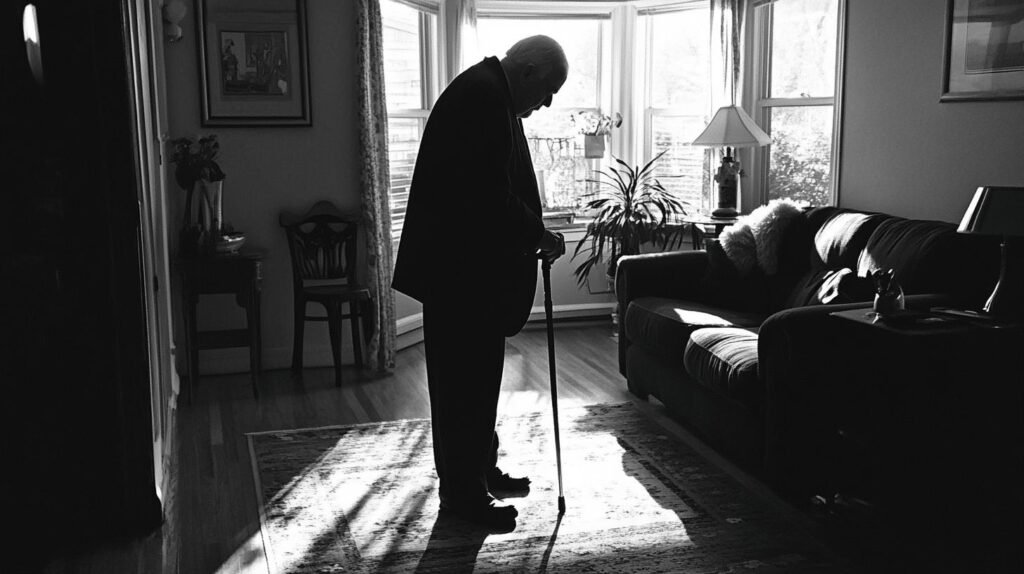TL;DR:
- Neurological diseases affecting balance include:
- Parkinson’s (motor control issues)
- Multiple Sclerosis (nerve disruption)
- Vestibular disorders (inner ear problems)
- Stroke (brain damage)
- Cerebellar Ataxia (affects balance center)
- Common balance disorder causes:
- Inner ear issues, neurological disorders, brain/spinal cord injuries, certain medications, physical injuries.
- Diagnostic methods:
- Medical history assessment, physical exams, vestibular tests, neurological exams, MRI scans.
- Treatments:
- Vestibular rehabilitation therapy, exercises (gaze stabilization, balance retraining), and healthy lifestyle changes.
- Lifestyle tips:
- Regular exercise, balanced diet, home safety, supportive footwear, vision checks.
Direct primary care offers affordable, personalized support.
Ever felt like the ground is shifting beneath your feet? You’re not alone. Neurological diseases affecting balance, like Parkinson’s, aren’t just about shaky movements—they can seriously mess with your stability. Picture your brain as the control centre, juggling info from your eyes, ears, and muscles to keep you upright. Now, imagine what happens when diseases jumble those signals—it’s like trying to walk a tightrope blindfolded! Today’s chat dives into these balance-related neurological conditions and how they disrupt life. Let’s unravel how this all plays out!
Understanding Neurological Diseases Affecting Balance
Ever wonder why balance becomes tricky for some people? Neurological diseases often play a big role. The central nervous system (CNS) coordinates sensory inputs from the eyes, ears, and muscles. When the CNS is disrupted, our balance suffers.
So, what’s happening when these conditions arise? It’s like trying to walk a tightrope in a storm when the CNS can’t synchronize signals. This leads to unsteady moments, coordination issues, and a higher risk of falling.
Here are some common neurological diseases affecting balance:
- Parkinson’s Disease: This affects motor control, causing tremors and stiffness, making the body’s “GPS” constantly adjust.
- Multiple Sclerosis (MS): MS disrupts nerve coverings, complicating coordination like trying to herd cats.
- Vestibular Disorders: These affect the inner ear’s balance function, leading to dizziness and vertigo—your own merry-go-round.
- Stroke: Strokes can damage brain tissue, confusing brain-body communication and spinning balance off course.
- Cerebellar Ataxia: It hits the cerebellum (the balance hub), making walking akin to a game of Twister.
Why is it important to understand these conditions? Knowing the root causes helps tackle them directly. Direct primary care makes managing these issues affordable, with no insurance hassles. If balance problems have you feeling off, it might be time to see your healthcare buddy.
Symptoms and Causes of Balance Disorders

Feeling a bit off-balance or dizzy? You’re not alone. Balance disorders can sneak up, making life feel like a merry-go-round. Common symptoms include dizziness, a falling sensation, and staggering like after too many drinks. But what’s causing these wobbly moments?
Balance difficulties can arise from a mix of factors. The inner ear is often suspect, notably in conditions like vertigo, affecting 20-30% of people. Neurological disorders and physical injuries also contribute.
Here’s a look at common causes of balance disorders:
- Inner Ear Problems: Conditions like Benign Paroxysmal Positional Vertigo (BPPV) disrupt equilibrium.
- Neurological Disorders: Diseases like MS and Parkinson’s interfere with nerve signals, leading to balance issues.
- Brain Injuries: Trauma to the head can hinder brain processing of balance information.
- Spinal Cord Injuries: Damage here severs brain-body connections, causing challenges.
- Medications: Some drugs affect balance, making side effect awareness crucial.
- Physical Injuries: Broken bones or muscle injuries complicate balance maintenance.
Understanding these causes is like having a map to navigate tricky balance issues. Knowing the source enables steps to regain stability. Direct primary care can guide you, offering affordable support without insurance red tape. If balance woes trouble you, it’s time to explore deeper causes and steady your ground.
Diagnostic Approaches for Neurological Balance Issues
How do doctors figure out balance issues? Diagnosing neurological balance problems is like solving a puzzle. It starts with thoroughly examining your medical history to link past health conditions with current balance issues.
Then, a physical exam follows—not just the knee-tapping kind! This step checks for visible signs of balance disorders. What’s in the diagnostic toolkit? Let’s see:
- Vestibular Test Battery: These tests check how well the inner ear and brain work together for balance.
- Neurological Examinations: These identify any nerve function red flags in the nervous system.
- MRI Scans: They reveal any physical changes in the brain affecting balance.
- Balance Assessments: These are balance obstacle courses that test your equilibrium.
You might worry about costs. But, direct primary care (DPC) offers affordable diagnostic services, skipping insurance complexities. There are no approval wait times or hoops to jump through—just the care you need. If you’re feeling off-balance, these tests can pinpoint the problem, helping you stand steady again.
Treatment and Management of Balance Disorders

Feeling like your balance is on a roller coaster? Let’s look at managing that ride with smart strategies. Treatment often begins with vestibular rehabilitation therapy, like a personal trainer for your balance system. Targeted exercises help regain equilibrium.
Curious about those exercises? Here are a few:
- Gaze Stabilization: Focus on an object while moving your head from side to side. This recalibrates vision and balance.
- Balance Retraining: Standing on one foot improves stability, similar to yoga but with a balance twist!
- Walking Exercises: Heel-to-toe walking along a line boosts coordination, like a balance sobriety test.
- Head Movement Exercises: Moving your head in different directions while walking enhances spatial awareness.
- Cawthorne-Cooksey Exercises: These involve moving your eyes, head, and body to reduce dizziness.
How does direct primary care fit in? DPC offers personalized care without insurance hassles. Doctors tailor therapy plans to fit you, ensuring effectiveness and affordability. It’s more focused on you and less on paperwork.
Preventive measures and lifestyle changes are vital, too. Regular exercise, a balanced diet, and fall prevention strategies matter. Craft a routine that supports your balance journey. Whether through therapy or lifestyle tweaks, managing balance disorders is about finding and sticking with what works best.
Daily Living and Lifestyle Adjustments for Balance Improvement
Maintaining balance can feel like juggling on a tightrope, but lifestyle tweaks make it easier. Regular balance exercises are key. They work your stability muscles, helping you stay steady. Paired with a balanced diet, you gain a superpower against wobbliness. A balanced diet fuels your body with energy and nutrients to maintain balance.
Are you wondering about the exercises? Try standing on one leg, heel-to-toe walking, or yoga. These strengthen muscles and improve coordination, so you’re prepared for sudden stumbles.
Lifestyle tips for better balance and fewer falls:
- Regular Exercise: Keep muscles strong and joints flexible with daily activity.
- Balanced Diet: Nutrient-rich foods boost energy and muscle function.
- Home Safety: Remove tripping hazards like loose rugs from your space.
- Footwear Choices: Wear supportive shoes to avoid slips and trips.
- Vision Checks: Ensure clear eyesight for better balance signal processing.
Direct primary care (DPC) supports you on this journey. With DPC, receive personalized guidance on lifestyle changes without insurance headaches. Your doctor helps tailor a plan for better balance.
Final Words
Throughout this article, we’ve journeyed through the complexities of neurological diseases affecting balance. We’ve explored how the central nervous system keeps us steady and what happens when it stumbles due to conditions like Parkinson’s or multiple sclerosis. Understanding these balance-related symptoms is crucial for managing their impact on daily life.
Diagnosing and managing these issues require a comprehensive approach, from thorough neurological examinations to personalized treatment plans. Living with balance disorders becomes more manageable with the right balance therapy and lifestyle tweaks.
It’s all about taking proactive steps to enhance your quality of life while partnering with your healthcare providers.
FAQ
Why do I feel off-balance but not dizzy?
Feeling off-balance without dizziness could be due to issues like muscle weakness, vision problems, or anxiety. It’s important to consult a healthcare provider to determine the exact cause.
What neurological disorders cause balance problems?
Neurological disorders like Parkinson’s disease, multiple sclerosis, and vestibular disorders can cause balance problems. They affect the central nervous system’s ability to maintain balance.
What is the best treatment for balance problems?
The best treatment involves addressing the root cause, often through vestibular rehabilitation therapy. This includes exercises, medications, and sometimes surgical interventions to improve balance.
What are three common medical conditions that may cause balance issues?
Three common conditions include Parkinson’s disease, inner ear infections, and vertigo. These can disrupt balance systems within the body, leading to coordination issues.
What causes loss of balance when walking?
Loss of balance when walking can stem from neurological disorders, inner ear problems, or physical injuries. Medications and ageing also contribute to these issues.
What is losing balance a symptom of?
Losing balance can be a symptom of conditions like vertigo, cardiovascular problems, or neurological disorders. It’s crucial to diagnose the underlying issue for proper treatment.
Why am I unsteady when I walk?
Feeling unsteady while walking may be due to balance disorders, weak muscles, or vision changes. Consulting with a healthcare provider can help pinpoint the cause.
What neurological disorder affects balance?
Parkinson’s disease and multiple sclerosis are common neurological disorders affecting balance. They impact the brain’s ability to process sensory inputs and maintain coordination.
What disease causes you to lose your balance?
Diseases like vestibular disorders, multiple sclerosis, and Parkinson’s disease can lead to balance loss. These conditions interfere with the body’s ability to coordinate movements effectively.

